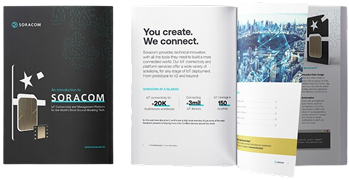
New Soracom IoT SIM options help projects scale affordably
Making IoT SIM cards more accessible
We know that as deployments grow past early testing phases, the cost of physical IoT SIM cards can add up too.
When we talk about helping IoT deployments scale affordably, we usually focus on things like reducing data cost with automatic volume pricing, making network management easier with the Soracom console and API, or limiting the need for custom integrations with built-in adapters for leading cloud services.
But it all begins with a physical SIM card. That’s why we’re offering a couple of new ways for customers with growing IoT fleets to access Soracom IoT SIMs and eSIMs. For the standard IoT SIM, you can now purchase boxes of 250 for an immediate 10% per-card discount. For Soracom eSIMs, we’ve reduced the minimum order from 3000 eSIMs to 1000 eSIMs. This lets projects can scale up in smaller increments, with lower upfront cost.
Standard IoT SIM: box of 250
The standard Soracom IoT SIM card delivers reliable multi-carrier connectivity in over 130 countries worldwide. It also offers access to advanced capabilities like the Soracom management console and API, usage alerts, bandwidth controls, and a range of cloud integration and private networking services.
Typically, each card costs $5.00, but for larger deployments you can now purchase a box of 250 SIM cards at a reduced cost of $4.50 per SIM. In addition to offering the convenience of a single delivery, ordering by the box ensures sequential ICCID and IMSI numbers for each set of 250.
Soracom IoT eSIM: reel of 1000
While we do offer sample-size sheets of 10, Soracom eSIMs are usually sold commercially in reels of 3000. We know that moving into mass production is a big step, and we want to make it easier and more affordable. We’re happy to announce that we’ve been able to reduce the minimum order to 1000 eSIMs.
When we announced the Soracom eSIM back in 2017, we knew it was going to be important to our customers. Today, we connect over a million devices around the world, and half of them use eSIMs!
We shouldn’t be surprised. In addition to supporting more compact form factors, eSIMs are generally more rugged and durable than standard SIMs. This makes them ideal for exactly the kinds of real-world IoT use cases that depend on cellular connectivity.
Our customers now use eSIMs for everything from wearables and consumer electronics to asset trackers and transportation solutions.
MORE LIKE THIS




What is Soracom?
Discover why technology innovators choose Soracom for connecting their
devices to the cloud over cellular.

Soracom's Picks
Advices and interviews, to inform and inspire.

IoT Connectivity for Construction Sites: Fiber vs. Satellite vs. Cellular (4G/5G)
The Site Manager’s Dilemma: Speed vs. Stability vs. Security When…

Why Network-Agnostic Connectivity is the Lifeblood of Physical AI
In the world of enterprise IoT, we are witnessing a…

Beyond the Chatbot: Exploring the Future of “Physical AI” at AWS re:Invent 2025
Note: This article is based on a report from Tech…


Champion in IoT
Connectivity Management
Soracom Named as a Champion for IoT Connectivity Management in 2023 Kaleido Intelligence Connectivity Vendor Hub











